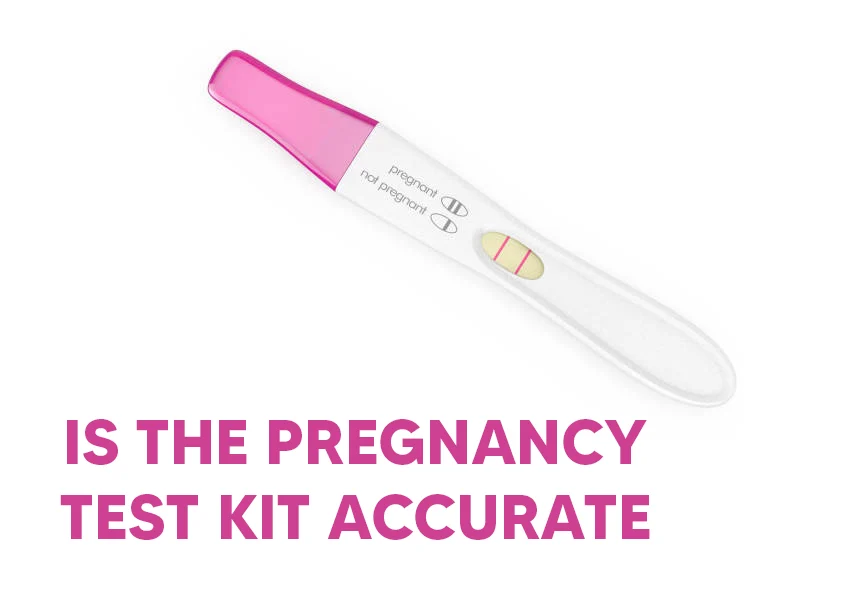Is the Pregnancy Test Kit Accurate?
Convenience is really important when it comes to pregnancy detection. Home pregnancy test kits have transformed this process, providing a private, rapid, and simple way to verify the beginning of maternity. Most people are interested in how reliable these kits are. “To begin with, is pregnancy test kit accurate? It is a frequently asked question from users.
How Do Pregnancy Test Kits Work?
In fact, most home pregnancy test
kits rely on the detection of hCG, a hormone released from the placenta within
a few days of implantation of a fertilized egg in the ante lobe of the uterus.
This very rapid increase in hCG levels at the early stages of pregnancy makes
it the most ideal marker for pregnancy detection.
The majority of test kits detect hCG
in urine via a chemical reaction. When the urine is applied to the test strip,
it reacts with the reagents in the kit, producing a visible result — usually a
line, plus sign, or digital readout of “pregnant” or “not pregnant.”
Factors That Affect Pregnancy Test Accuracy
● Timing of the Test: Home pregnancy
test accuracy depends largely on when you take the test. Testing too
early - before enough hCG has built up in your system - can lead to a false
negative result. For best results, it’s recommended to test after a missed
period.
● Sensitivity of the Test Kit:
Different brands have varying levels of sensitivity. Some kits can detect lower
levels of hCG and provide results earlier than others. If you’re wondering
“which pregnancy test kit is best,” look for one with high sensitivity, often
labeled as “early detection.”
● Correct Usage: Following the
instructions is critical for an accurate result. Improper handling, such as
using too much or too little urine, or not waiting the specified amount of time
to read the result, can lead to errors.
● Medication and Health Conditions: Certain medications, such as those containing hCG or used in fertility treatments, may affect the results. Health conditions such as ovarian cysts or more unusual cancers can also yield false positives.
How Accurate Are Home Pregnancy Tests?
If done correctly, modern home
pregnancy tests report accuracy rates ranging from 97-99%. However, user errors
and external factors can lower this reliability. Here are the scenarios where
reliability might falter:
False Negatives: This happens when
the test reads negative while you are pregnant. Testing too soon, diluted urine
(e.g., from excessive fluids) and expired test kits are common reasons.
False Positives: These are less common but can happen due to residual hCG from a recent pregnancy, miscarriage, or certain medications.
Tips to Maximize Accuracy
Instructed The Ability: Why It’s
Important: Each pregnancy test kit may have specific instructions regarding how
to use it, when to test and how to read the results. Mistakes in any of
these areas can result in inaccurate outcomes. What to Do: Read the entire
instruction manual that comes with the test kit before you get started.
Familiarize yourself with the
symbols or lines indicating positive, negative, or invalid results.
Use a clean, dry container if the
test requires collecting urine rather than directly testing the stream.
Adhere to the timing mentioned in
the instructions. Reading results too early or too late can give misleading
outcomes.
Use First-Morning Urine: Morning
urine typically contains the highest concentration of hCG, improving the
chances of accurate detection.
Check the Expiry Date: Using an
expired pregnancy test kit can compromise its effectiveness.
Wait After a Missed Period: Testing
at least one week after a missed period provides more reliable results.
Repeat the Test: If you receive a negative result but still suspect pregnancy, repeat the test a few days later.
Can a Pregnancy Test Kit Be Wrong?
While home pregnancy tests are
generally accurate, no test is infallible. Errors can arise due to:
Human Error: Misinterpreting the
results or not following instructions properly.
Also, once in a while, the test kit might be defective due to manufacturing defects or it might be ruined due to improper storage.
Biological Variability: Differences in hCG levels or uncommon medical conditions can impact results.
If you get conflicting results or are still unsure, a blood test at a doctor’s office is the gold standard for providing confirmation. Blood tests are more sensitive and can detect the slightest presence of hCG - smaller than urinalysis.
Other Factors to Consider
It can be more complex for women with irregular menstrual cycles to establish when is the best time to carry out the test. For these situations, tracking ovulation or using an ovulation predictor kit can help find the best time period for testing.
Hydration Levels: Drinking too much water right before a test can water down the levels of hCG found in urine, causing a false negative. Make sure you are not hyperhydrated before you do the test.
Tension and Hormonal Imbalances:
Occasionally, high stress levels or hormonal imbalances can mimic pregnancy
symptoms, causing periods of time not to arrive. A pregnancy test in such
situations can help clarify.
Which Is The Best Pregnancy Test Kit?
Choosing a good pregnancy test kit
is important that provide the correct result. The most trusted brands: First
Response Early Result: Very sensitive; detects pregnancy up to six days before
a missed period. Clearblue Digital Pregnancy Test: Provides a simple digital
display and a weeks estimator to help gauge how far along you may be.
EPT Pregnancy Test: A reliable
option with a simple interface.
AccuClear Pregnancy Test: Budget-friendly while maintaining effectiveness, this test is lauded for its clarity and accuracy.
ClinicalGuard Pregnancy Test Strips: For the frequent tester on a budget.
Choose a pregnancy test kit that
keeps in mind specifications such as ease of use, visible result, and
sensitivity.
When to See a Doctor
If you get ambiguous or different
results from home tests, talk to your healthcare provider. They might order
a blood test or ultrasound to verify pregnancy. If an ectopic pregnancy
is suspected - signaled by sights such as sharp abdominal pain or dizziness - get medical care right away.
Conclusion: How Accurate Are Pregnancy Test Kits
Home pregnancy test kits offer a reliable detection method for early pregnancy and they offer a high rate of accuracy if used correctly. However, timing, test sensitivity, and user adherence to instructions can affect their reliability. If you’re asking “Are home pregnancy tests accurate?” the answer is largely driven by those variables.
To ensure the most accurate results,
pick a reputable brand, follow the instructions to the letter, and test at the
right time. False positives and negatives are rare, but they can happen, so
it’s always best to consult with a healthcare provider for confirmation. You
can use these kits with confidence and peace of mind once you understand how
they work and what their limitations are.
Frequently Asked Questions (FAQ)
Q: When can I take a pregnancy test?
A: Most tests suggest that you wait until the first day of your missed period. Some super-sensitive tests can determine pregnancy up to six days before a missed period.
Q: Is it okay to take a pregnancy
test kit at any time during the day?
A: You can test at any time, but first-morning urine is best because it’s the most concentrated with hCG.
Q: What does a faint line on a
pregnancy test indicate?
A: A faint line is still considered a positive result, but this may mean you have low levels of hCG. (Though do retest in a few days for a clearer result.)
Q: Do medications have an impact on
my pregnancy test results?
A: Certain medications, such as fertility drugs that contain hCG, can influence results. If you’re uncertain, check with your doctor.
Q: Are digital pregnancy tests
better than the traditional ones?
A: Both are equally as accurate when used properly. Digital tests have more clearly visible results, which could lower user error.
Q: What do you do if your results
are conflicting?
A: If you’re getting different results, wait a couple of days and retest, or ask your healthcare provider to do a blood test.
Q: Can stress delay my period and
affect test accuracy?
A: Stress can delay your period, leading to confusion. However, it doesn’t directly affect the test’s ability to detect hCG.
Q: How long should I wait to retest
after a negative result?
A: Wait at least two to three days
before retesting if your period hasn’t started, as hCG levels double
approximately every 48 hours in early pregnancy.


